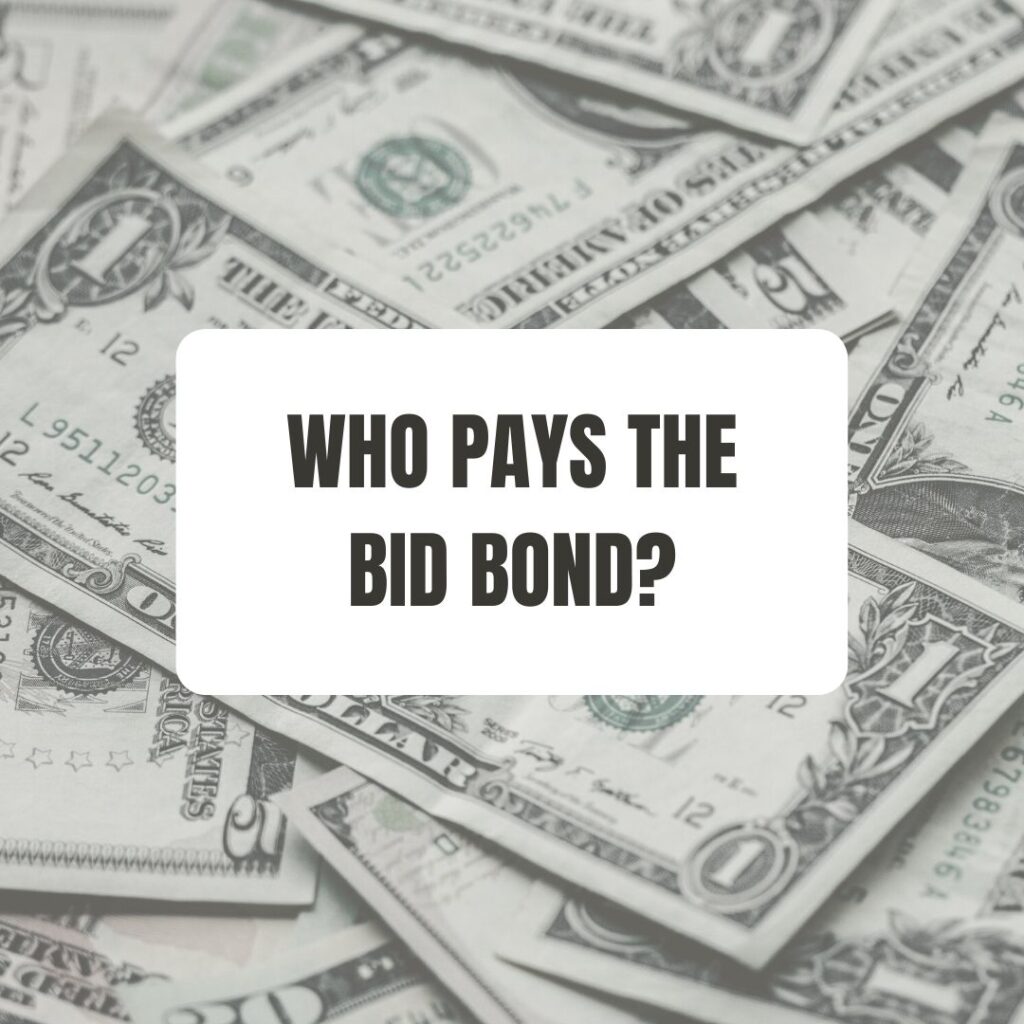When you are bidding on a construction project, you will likely be required to provide a bid bond. But who pays the bid bond? This is a question that many people don’t know the answer to. In this blog post, we will discuss who pays the bid bond and what it is used for.

Understanding Bid Bonds?
A bid bond is a type of surety bond that is required by many public and private entities to ensure that the bidder on a project will follow through with their bid. If the bidder does not follow through, the entity can claim the bond and be compensated for any damages.
Bid bonds are often required for construction projects, and they can range in value from a few thousand dollars to millions of dollars. The purpose of the bond is to protect the entity from losing money if the bidder does not follow through on its bid.
If you are bidding on a project that requires a bid bond, it is important to understand how they work and what your obligations are. Failure to follow through on your bid can result in serious financial consequences.
Writing A Bid Bonds
The process of writing a bid bond is relatively simple. The first step is to contact a surety company and provide them with information about the project you are bidding on. The surety company will then provide you with a quote for the bond. If you are happy with the quote, you will then fill out an application and provide any collateral that may be required. Once the surety company has all of the necessary information, they will issue the bond.
Who Provides A Bid Bond?
The answer to this question depends on the country in which the project is taking place. In the United States, for example, bid bonds are typically provided by surety companies. These companies specialize in providing financial guarantees to contractors and are regulated by the federal government. In other countries, bid bonds may be provided by banks or insurance companies.
Who Pays The Bid Bond?
The answer may surprise you. The bid bond is paid by the contractor. That’s right, the company that wants to win the job pays the bid bond. The purpose of the bid bond is to protect the owner in case the contractor doesn’t follow through on their bid.
What Is A Good Bid Bond Company?
You should ask yourself a few questions before selecting a bid bond company. Does the company have experience? What is the company’s financial stability? What is the company’s customer service like?
Make sure you do your research before selecting a bid bond company. It will save you time and money in the long run.
What Are The Requirements To Obtain A Bid Bond?
The requirements for obtaining a bid bond are generally the same as those for any other type of surety bond. The applicant must have a good credit history and be able to demonstrate financial responsibility. In addition, the applicant must have a sound business plan and be able to show that he or she has the experience and resources necessary to complete the project.
Why Is A Bid Bond Required?
A bid bond is a type of surety bond that is required in order to bid on certain types of contracts. The purpose of a bid bond is to protect the contracting entity in case the successful bidder fails to enter into the contract or perform the work as specified. In order to obtain a bid bond, the contractor must typically provide some form of collateral, such as a letter of credit or cash deposit, to the surety company.
How Do Bid Bonds Work?
When a company bidding on a project is required to post a bid bond, the company is essentially making a guarantee to the organization that it will follow through on its bid if it is awarded the contract. If the company does not follow through, it may be required to pay a penalty, which can be used to cover the costs of re-soliciting bids or awarding the contract to another company.
Construction Bid Bond Claims Can Put You At Risk
If a contractor defaults on their contract, the surety company that issued the bond may file a claim against you. The claim will allege that you are liable for the amount of money owed to the surety company. If you are found liable, you will be responsible for paying the surety company back.
Is A Bid Bond Returned?
The answer to this question is a bit complicated. Technically, the bid bond is not returned. The successful bidder does not get their money back. The bid bond is simply forfeited to the project owner if the successful bidder fails to perform.
However, in practice, many times the project owner will return the money to the successful bidder. The thinking is that the successful bidder put up the money as a good faith gesture and should not be penalized if they perform as agreed.
How Much Is A Typical Bid Bond?
The answer to this question depends on a few factors, including the size and scope of the project, the location of the project, and the financial strength of the bidder. Generally speaking, bid bonds for construction projects range from $500 to $100,000. For larger projects, or projects located in high-risk areas, bid bonds can be as high as $250,000 or more.